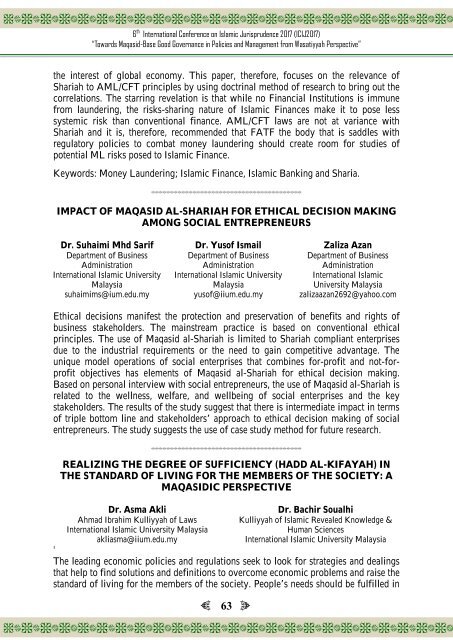PROGRAMME ABSTRACT BOOK
Program%20Book%20ICIJ2017%20-final%2016%20-%202-%202017
Program%20Book%20ICIJ2017%20-final%2016%20-%202-%202017
You also want an ePaper? Increase the reach of your titles
YUMPU automatically turns print PDFs into web optimized ePapers that Google loves.
6 th International Conference on Islamic Jurisprudence 2017 (ICIJ2017)<br />
“Towards Maqasid-Base Good Governance in Policies and Management from Wasatiyyah Perspective”<br />
<br />
<br />
<br />
the interest of global economy. This paper, therefore, focuses on the relevance of<br />
Shariah to AML/CFT principles by using doctrinal method of research to bring out the<br />
correlations. The starring revelation is that while no Financial Institutions is immune<br />
from laundering, the risks-sharing nature of Islamic Finances make it to pose less<br />
systemic risk than conventional finance. AML/CFT laws are not at variance with<br />
Shariah and it is, therefore, recommended that FATF the body that is saddles with<br />
regulatory policies to combat money laundering should create room for studies of<br />
potential ML risks posed to Islamic Finance.<br />
Keywords: Money Laundering; Islamic Finance, Islamic Banking and Sharia.<br />
<br />
IMPACT OF MAQASID AL-SHARIAH FOR ETHICAL DECISION MAKING<br />
AMONG SOCIAL ENTREPRENEURS<br />
Dr. Suhaimi Mhd Sarif<br />
Department of Business<br />
Administration<br />
International Islamic University<br />
Malaysia<br />
suhaimims@ium.edu.my<br />
Dr. Yusof Ismail<br />
Department of Business<br />
Administration<br />
International Islamic University<br />
Malaysia<br />
yusof@iium.edu.my<br />
Zaliza Azan<br />
Department of Business<br />
Administration<br />
International Islamic<br />
University Malaysia<br />
zalizaazan2692@yahoo.com<br />
Ethical decisions manifest the protection and preservation of benefits and rights of<br />
business stakeholders. The mainstream practice is based on conventional ethical<br />
principles. The use of Maqasid al-Shariah is limited to Shariah compliant enterprises<br />
due to the industrial requirements or the need to gain competitive advantage. The<br />
unique model operations of social enterprises that combines for-profit and not-forprofit<br />
objectives has elements of Maqasid al-Shariah for ethical decision making.<br />
Based on personal interview with social entrepreneurs, the use of Maqasid al-Shariah is<br />
related to the wellness, welfare, and wellbeing of social enterprises and the key<br />
stakeholders. The results of the study suggest that there is intermediate impact in terms<br />
of triple bottom line and stakeholders’ approach to ethical decision making of social<br />
entrepreneurs. The study suggests the use of case study method for future research.<br />
<br />
REALIZING THE DEGREE OF SUFFICIENCY (HADD AL-KIFAYAH) IN<br />
THE STANDARD OF LIVING FOR THE MEMBERS OF THE SOCIETY: A<br />
MAQASIDIC PERSPECTIVE<br />
Dr. Asma Akli<br />
Ahmad Ibrahim Kulliyyah of Laws<br />
International Islamic University Malaysia<br />
akliasma@iium.edu.my<br />
63<br />
Dr. Bachir Soualhi<br />
Kulliyyah of Islamic Revealed Knowledge &<br />
Human Sciences<br />
International Islamic University Malaysia<br />
'<br />
The leading economic policies and regulations seek to look for strategies and dealings<br />
that help to find solutions and definitions to overcome economic problems and raise the<br />
standard of living for the members of the society. People’s needs should be fulfilled in


